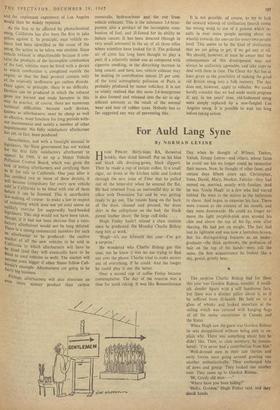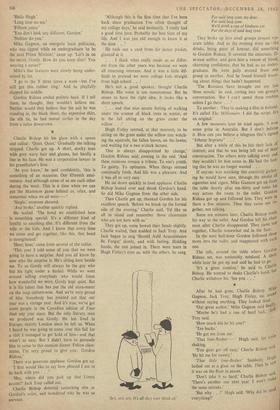For Auld Lang Syne
By NORMAN LEVINE
HUGH FINLAY, thirty-nine, BA, showered briskly, then dried himself. Put on his blue and black silk dressing-gown, black slippers. Then he made a cup of instant coffee, lit a small cigar, sat down at the kitchen table and looked through the new issue of Time that he pulled out of the letter-slot when he entered the flat. He had returned from an uneventful day at the office with Dominion Tar and he was getting ready to go out. The tuxedo hung on the back of the door, cleaned and pressed; the dress shirt in the cellophane on the bed; the black patent leather shoes; the large cuff-links. . . .
Hugh Finlay hadn't missed a class reunion since he graduated. On Monday Charlie Bishop rang him at work.
'Hugh—it's our fifteenth this year—I've got a surprise.'
He wondered who Charlie Bishop got this time, but he knew it was no use trying to find out over the phone. Charlie tried to make secrets out of everything, if he could. And the longer he could play it out the better.
Over a second cup of coffee Finlay became contemplative. The day of the reunion was a time for stock-taking. It was like Remembrance
Day when he thought of Wilmot, Tucker, Veitch, Jimmy Letros—and others, whose faces he could see but no longer could he remember their names. Now, he thought of other faces, and certain days fifteen years ago. Christopher, Irene, David, Mary, Hooker, Felicity—they had moved on, married, mostly with families. And he was 'Uncle Hugh' to a few who had stayed behind. He went to the mirror in the bathroom to shave. And began to examine his face. There were creases at the corners of his mouth, and they went downwards. He could no longer re- move the light purplish-pink area around his chin and above the top of his lip, even after shaving. He had put on weight. The hair had lost its lightness and was now a lustreless brown. But his distinguishing features as an under- graduate—the thick eyebrows, the profusion of hair on the top of his hands—were still the same. On first acquaintance he looked like a shy, genial, grizzly bear.
The surprise Charlie Bishop had for them this year was Gordon Rideau, novelist. A small- ish, slender figure with a still handsome face, but there was a distinct pallor about it, as if he suffered from ill-health. He held on to a glass of whisky and looked uncertain at the ceiling which was covered with hanging flags of all the name universities in Canada and the States.
When Hugh saw the guest was Gordon Rideau he was disappointed without being able to ex- plain why. There was something about him he didn't like. Then, as class secretary, he remem- bered : 'I've never had a contribution from him.'
Well-dressed men in their late thirties and early forties were going around greeting one another enthusiastically. They exchanged bits of news and gossip. They looked one another over. They came up to Gordon Rideau.
'Hi, Gordy old man
''Where have you been hiding?'
'Hello, Gordon,' Hugh Finlay said, and they shook hands. 'Hello Hugh.'
'Long time no see.'
'Fifteen years.'
'You don't look any different, Gordon.' 'Neither do you.'
Mike Gagnon, an energetic local politician, who was tipped while an undergraduate `to be the next Prime Minister,' came up. 'Let's in on the secret, Gordy. How do you keep slim? You wearing a corset?'
Mike's fine features were slowly being under- mined by fat.
'I go to the Y three times a week—but I've still got this rubber ring.' And be playfully slapped his middle.
Gordon Rideau smiled politely back. If I tell them, he thought, they wouldn't believe me. Neither would they believe that the suit he was standing in, the black shoes, the expensive shirt, the silk tie, he had rented earlier in the day from a tailor downtown.
Charlie Bishop hit his glass with a spoon and called: 'Quiet. Quiet.' Gradually the talking stopped. Charlie got up. A short, stocky man with grey wavy hair and glasses, but hardly a line in his face. He was a corporation lawyer in his grandfather's firm.
'As you know,' he said confidently, 'this is something of an occasion. Our fifteenth anni- versary. And although some of us see each other during the week. This is a time when we can put the Mammon game behind us, relax, and remember when we all were—' 'Single,' someone shouted.
'And broke,' another quickly replied.
He waited. 'The bond we established here is something special. It's a different kind of loyalty to anything else. It's different from the wife or the kids. And I know that every time we come and get together, like this, that bond is strengthened.'
'Hear, hear,' came from several of the tables.
'This year I told some of you that we were going to have a surprise. And you all know by now who the surprise is. He's sitting here beside me. To us Gordy will always be the guy who hid his light under a bushel. While we went around telling everybody who would listen how wonderful we were, Gordy kept quiet. But it is his talent that has put the old alma-mater on the map culture-wise. And we're very proud of him. Somebody has pointed out that our year was a vintage year. And ifs true, we've got more people in the Canadian edition of Time than any year since. But the only literary man we produced was Gordy. He has lived in Europe, mainly London since he left us. When I heard he was going to come over this fall for a visit I managed to get hold of him—and that wasn't so easy. But I didn't have to persuade him to come to this reunion dinner. Fellow class- mates, I'm very proud to give you: Gordon Rideau.'
There was generous applause. Gordon got up. 'I first would like to say how pleased I am to be back with you . .
'Hey, where did you pick up that Limey accent?' Jack Troy called out.
Charlie Bishop detected something else in Gordon's voice, and wondered why he was so nervous. 'Although this is the first time that I've been back since graduation I've often thought of my college days,' he said hesitantly. 'I really had a good time here. Probably the best time of my Life. And I was just old enough to know it at the time . .
He took out a card from his jacket pocket, glanced at it.
. . I think what really made us so differ- ent from the other years was because we were all returning veterans. And it was a little dif- ficult to pretend we were college kids straight from high school . .
He's not a good speaker, thought Charlie Bishop. His voice is too monotonous. But he seems to have the right idea. It looks like a short speech.
. . and that nice secure feeling of walking under the avenue of black trees in winter, or in the fall sitting on the grass under the willow . .
Hugh Finlay seemed, at that moment, to be sitting on the grass under the willow tree watch- ing the squirrels, the fallen leaves, on the lawns; and waiting for a two o'clock lecture.
'One is always disappointed by change,' Gordon Rideau said, coming to the end. 'And these reunions remain a tribute. To one's youth. To gaiety. To optimism. When things seemed continually fresh. And life was a pleasure. And it was all so very easy..
He sat down quickly to loud applause. Charlie Bishop leaned over and shook Gordon's hand. So did Mike Gagnon from the other side.
Then Charlie got up, thanked Gordon for his excellent speech. 'Before we break up the formal side of the evening,' Charlie said, `I'd like us all to stand and remember those classmates who are not here with us.'
They got up, some bowed their heads slightly. Charlie waited, then nodded to Jack Troy. And Jack began to sing 'Should Auld Acquaintance Be Forgot' slowly, and with feeling. Holding hands, the rest joined in. There were tears in Hugh Finlay's eyes as, with the others, he sang.
'Sex, sex, sex. Ms all they ever think of.'
For auld tang sync, my dear. For auld lang sync.
Well drink a cup of kindness yet. For the days of auld tang sync.
They broke up into small groups around sep- arate tables. And as the evening wore on—the drinks, being guest of honour, did something to Gordon Rideau: It covered the uncertain, ill- at-ease author, and gave him a veneer of bland, charming confidence, that he had as an under- graduate. He went gaily around from one group to another. And he found himself boast- ing about things that hadn't happened.
The Russians -have brought out my last three novels,' he said, cutting into one group's conversation. 'But I can't spend those roubles unless I go there . . To another: 'They're making a film in Ireland. It's called The Millionaire. I did the script. It's an original.'
A few moments later he tried again. 'I svon some prize in Australia. But I don't believe it. How can you believe a telegram that's signed "Johnny Soprano" . . But after a while of this he felt their lack of interest; and that he was being left out of their conversation. The others were talking away and they wouldn't let him come in. He had the feel- ing that he was no longer wanted . . .
If anyone was watching this convivial gather- ing he would have seen, through the smoke of cigarettes and cigars, Mike Gannon get up from the table shortly after ten-thirty and make his way across the room to the toilet. Gordon Rideau got up and followed him. They were in there a few minutes. Then. they came out to- gether, not talking.
Some ten minutes later, Charlie Bishop made his way to the toilet. And Gordon left his chair soon after Charlie disappeared. They came out together, Charlie somewhat red in the face.
In the next half-hour Gordon followed thrce more into the toilet, and reappeared with each one.
The talk, around the table where Gordon Rideau sat, was noticeably subdued. A short while later he got up and said he had to go.
'It's a great reunion,' he said to Charli° Bishop. He wanted to shake Charlie's hand, but Charlie withdrew his. 'See you . .
After he had gone, Charlie Bishop, Mil°, Gagnon, Jack Troy, Hugh Finlay, sat rounu without saying anything. They looked tired. 'Our great author,' Mike Gagnon said llnal131,',
pcis 'Maybe he's had a run of hard luck. Troy said.
'How much did he hit you?' 'Ten bucks.'
'He got ten from me.'
`That four-flusher ' Hugh said, his vo
shaking.ice 'You guys got off easy,' Charlie Bishop said. 'He hit me for twenty.' 'That little four-flusher.' Suddenly Hugh lashed out at a glass on the table. Then he saW it was on the floor in pieces. 'Don't take it so hard,' Charlie Bishop sait 'There's another one next year. I won't nlal' the same mistake.'
'But why . ..?' Hugh said. Why did he everything?'































 Previous page
Previous page